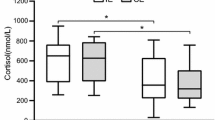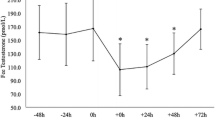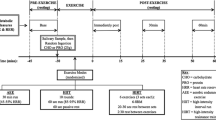Abstract
This study examined the effect of dietary carbohydrate (CHO) consumption on the free testosterone to cortisol (fTC) ratio during a short-term intense micro-cycle of exercise training. The fTC ratio is a proposed biomarker for overreaching–overtraining (i.e., training stress or imbalance) in athletes. The ratio was studied in two groups, control-CHO (~60% of daily intake, n = 12) and low-CHO (~30% of daily intake, n = 8), of male subjects who performed three consecutive days of intensive training (~70–75% maximal oxygen consumption, 60 min per day) with a dietary intervention (on the day before and during training). Resting, pre-exercise blood samples were collected under standardized-controlled conditions before each day of training (Pre 1, 2, 3) and on a fourth day after the micro-cycle (Rest). Bloods were analyzed for free testosterone and cortisol via radioimmunoassay procedures. Subjects performed no additional physical activity other than prescribed training. Statistical analysis (ANCOVA) revealed the fTC ratio decreased significantly (p < 0.01) from pre-study resting measurement (Pre 1) to the final post-study resting measurement (Rest) in the low-CHO group (−43%), but no change occurred (p > 0.05) in the control-CHO group (−3%). Findings suggest if the fTC ratio is utilized as a marker of training stress or imbalance it is necessary for a moderately high diet of CHO to be consumed to maintain validity of any observed changes in the ratio value.



Similar content being viewed by others
References
Adlercreutz H, Harkonen M, Kuoppasalmi K, Naveri H, Huhtaniemi I, Tikkanen H, Remes K, Dessypris A, Karvonen J (1986) Effect of training on the plasma anabolic and catabolic steroid hormones and their response during physical exercise. Int J Sports Med 7:27–28
Anderson KE, Rosner W, Khan MS, New MI, Pang S, Wissel PS, Kappas A (1987) Diet–hormone interactions: protein/carbohydrate ratio alters reciprocally the plasma levels of testosterone and cortisol and their respective binding globulins in man. Life Sci 40:1761–1768
Banfi G, Dolci A (2006) Free testosterone/cortisol ratio in soccer: usefulness of a categorization of values. J Sports Med Phys Fitness 46(4):611–616
Brooks GA, Fahey TD, Baldwin KM (2005) Exercise physiology: human bioenergetics and its applications. The McGraw Hill Companies, Boston
Brownlee KK, Moore AW, Hackney AC (2005) Relationship between circulating cortisol and testosterone: influence of physical exercise. J Sports Sci Med 4:76–83
Costa RJ, Jones GE, Lamb KL, Coleman R, Williams JH (2005) The effects of a high carbohydrate diet on cortisol and salivary immunoglobulin A (s-IgA) during a period of increase exercise workload amongst olympic and ironman triathletes. Int J Sports Med 26(10):880–885
Costill DL, Flynn MG, Kirwan JP, Houmard JA, Mitchell JB, Thomas R, Han Park S (1988) Effects of repeated days of intensified training on muscle glycogen and swimming performance. Med Sci Sports Exerc 20(3):249–254
Cumming DC, Quigley ME, Yen SC (1983) Acute suppression of circulating testosterone levels by cortisol in men. J Clin Endocrinol Metab 57:671–673
Daly W, Seegers CA, Rubin DA, Dobridge JD, Hackney AC (2005) Relationship between stress hormones and testosterone with prolonged endurance exercise. Eur J Appl Physiol 93(4):375–380
Dill DB, Costill DL (1974) Calculation of percentage changes in volumes of blood, plasma, and red cells in dehydration. J Appl Physiol 37(2):247–248
Evans WJ, Hughes VA (1985) Dietary carbohydrates and endurance exercise. Am J Clin Nutr 41:1146–1154
Filaire E, Legrand B, Bret K, Sagnol M, Cottet-Emard JM, Pequignot JM (2002) Psychobiologic responses to 4 days of increased training and recovery in cyclists. Int J Sports Med 23(8):588–594
Galbo H (1983) Hormonal and metabolic adaptation to exercise. G Thieme Stuttgart, New York
Galbo H, Hummer L, Petersen IB, Christensen NJ, Bie N (1977) Thyroid and testicular hormone responses to graded and prolonged exercise in man. Eur J Appl Physiol 36:101–106
Galbo H, Holst JJ, Christensen NJ (1979) The effect of different diets and of insulin on the hormonal response to prolonged exercise. Acta Physiol Scand 107(1):19–32
Golding LA, Myers CR, Sinning WE (1982) The Y’s way to physical fitness. National Board of YMCA, Chicago
Hackney AC (1996) Testosterone, the hypothalamo-pituitary-testicular axis and endurance training: a review. Biol Sport 13(2):85–98
Hackney AC (2006) Stress and the neuroendocrine system: the role of exercise as a stressor and modifier of stress. Expert Rev Endocrinol Metab 1(6):783–792
Hackney AC, Dobridge J, Wilson LS (2000) The overtraining syndrome in athletes: hypothesis as to development and steps to treatment. Medicina Sportiva 4(1):E15–E28
Hoogeven AR, Zonderland ML (1996) Relationships between testosterone, cortisol and performance in professional cyclists. Int J Sports Med 17(6):423–428
Lehmann M, Foster C, Keul J (1993) Overtraining in endurance athletes: a brief review. Med Sci Sports Exerc 25(7):854–862
MacDougall JD, Wenger HA, Green HJ (1991) Physiological testing of the high performance athlete. Human Kinetics, Champaign
McMurray RG, Eubanks TK, Hackney AC (1995) Nocturnal hormonal responses to resistance exercise. Eur J Appl Physiol 72:121–126
Purge P, Jurimae J, Jurimae T (2006) Hormonal and psychological adaptation in elite male rowers during prolonged training. J Sports Sci 24(10):1075–1082
Safarinejad MR, Azma K, Kolhi AA (2009) The effects of intensive, long-term treadmill running on reproductive hormones, hypothalamus-pituitary-testis axis, and semen quality: a randomized controlled study. J Endocrinol 200(3):259–271
Snyder AC, Kuipers H, Cheng B, Servais R, Fransen E (1995) Overtraining following intensified training with normal muscle glycogen. Med Sci Sports Exerc 27(7):1063–1070
Urhausen A, Gabriel H, Kindermann W (1995) Blood hormones as markers of training stress and overtraining. Sports Med 20(4):251–276
Vaananen I, Vasankari T, Mantysaari M, Vihko V (2004) Hormonal responses to 100 km cross-country skiing during 2 days. J Sports Med Phys Fitness 44(3):309–314
Vervoorn C, Quist AM, Vermulst LJ, Erich WB, de Vries WR, Thijssen JH (1991) The behavior of the plasma free testosterone/cortisol ratio during a season of elite rowing training. Int J Sports Med 12(3):257–263
Author information
Authors and Affiliations
Corresponding author
Additional information
Communicated by Susan Ward.
Rights and permissions
About this article
Cite this article
Lane, A.R., Duke, J.W. & Hackney, A.C. Influence of dietary carbohydrate intake on the free testosterone: cortisol ratio responses to short-term intensive exercise training. Eur J Appl Physiol 108, 1125–1131 (2010). https://doi.org/10.1007/s00421-009-1220-5
Accepted:
Published:
Issue Date:
DOI: https://doi.org/10.1007/s00421-009-1220-5




